In the ever-evolving landscape of digital marketing, keyword research remains a cornerstone for successful blogging. As we move into 2024, it’s essential for bloggers to leverage the best keyword research tools to enhance their content strategy, improve SEO rankings, and drive organic traffic. This article highlights the top keyword research tools for bloggers in 2024 and beyond, along with tips on how to effectively use them.
Why Keyword Research is Crucial for Bloggers

Keyword research helps bloggers understand what their target audience is searching for. By identifying the right keywords, you can create content that meets the needs of your audience, increases visibility on search engines, and ultimately boosts traffic to your blog.
Benefits of Using Keyword Research Tools
- Enhanced SEO: By targeting relevant keywords, you can optimize your blog posts for search engines.
- Content Ideas: Discover new topics and angles to cover based on what your audience is searching for.
- Competitive Analysis: Understand what keywords your competitors are ranking for and how you can compete.
Top Keyword Research Tools for Bloggers in 2024
1. Ahrefs
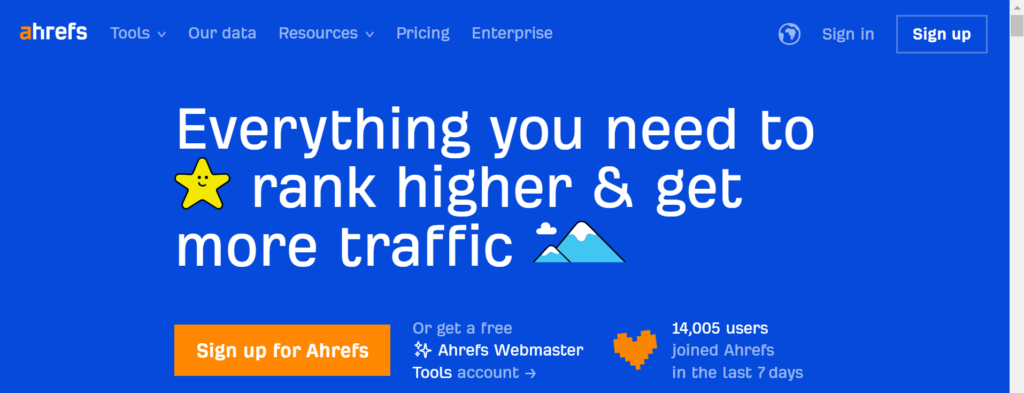
Ahrefs is a leading tool in the SEO landscape, offering an extensive suite of features for keyword research and competitive analysis. Its Keyword Explorer tool stands out for providing in-depth insights into search volume, keyword difficulty, and click-through rates (CTR). This tool enables bloggers and marketers to identify high-value keywords that align with their content strategies. Additionally, Ahrefs’ vast keyword database spans numerous languages and locations, making it ideal for both global and local SEO efforts.
Ahrefs goes beyond basic keyword analysis by offering competitor research and SERP analysis. It helps users dissect their competitors’ top-ranking pages and backlink profiles, giving actionable data to improve performance. With its user-friendly interface and accurate data, Ahrefs has become a go-to tool for professionals aiming to optimize their content and SEO strategies.
Features:
- Extensive keyword database with global and local coverage.
- In-depth SERP analysis to understand top-ranking pages.
- Competitor research tools for tracking rivals’ strategies.
- Keyword Explorer for search volume, difficulty, and CTR insights.
2. SEMrush
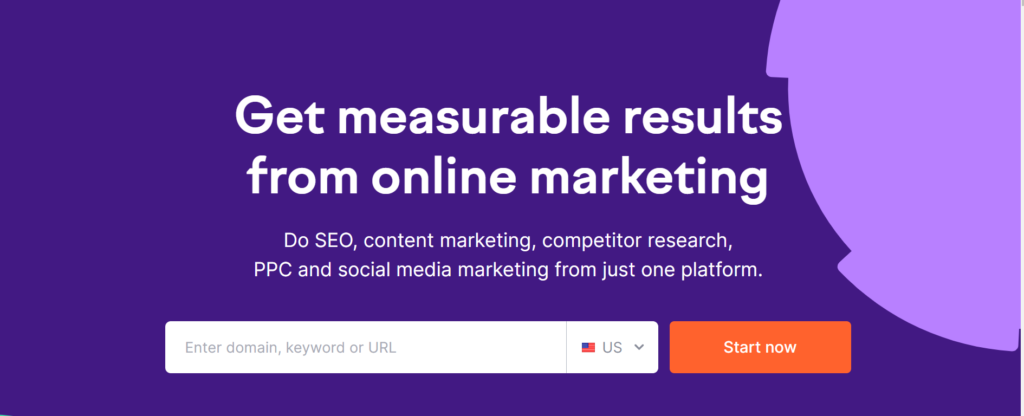
SEMrush is a comprehensive SEO and marketing toolkit widely recognized for its powerful keyword research capabilities. Its Keyword Magic Tool generates thousands of keyword ideas based on a root keyword and provides metrics like search volume, trends, and competition levels. This tool is particularly helpful for identifying high-performing keywords and uncovering content gaps. SEMrush’s ability to analyze keyword difficulty makes it a favorite among marketers looking to prioritize their efforts strategically.
Apart from keyword research, SEMrush offers features like domain comparison and topic research. These tools provide a holistic view of your website’s performance against competitors and help you find trending topics for content creation. Its detailed analytics and easy-to-use interface make SEMrush a top choice for bloggers and SEO professionals.
Features:
- Keyword Magic Tool for generating extensive keyword ideas.
- Comprehensive keyword analytics, including search trends and competition levels.
- Topic Research Tool for finding trending and relevant content ideas.
- Domain comparison for evaluating competitors’ performance.
3. Ubersuggest

Ubersuggest is a user-friendly SEO tool developed by Neil Patel, designed to simplify keyword research and SEO analysis. It is especially beneficial for bloggers and small businesses, as it combines simplicity with powerful functionality. Ubersuggest provides keyword suggestions, search volume, and SEO difficulty ratings, enabling users to identify the best opportunities for their niche. Its intuitive interface makes it ideal for beginners exploring the world of SEO.
Additionally, Ubersuggest offers features like backlink data and content analysis, helping users enhance their on-page and off-page SEO strategies. For those on a tight budget, the free version of Ubersuggest is a valuable starting point, while the premium plans unlock advanced features for deeper insights.
Features:
- Keyword suggestions with search volume and difficulty ratings.
- Backlink data to analyze link-building opportunities.
- SEO analysis for improving on-page performance.
- Budget-friendly options with a free version available.
4. Google Keyword Planner
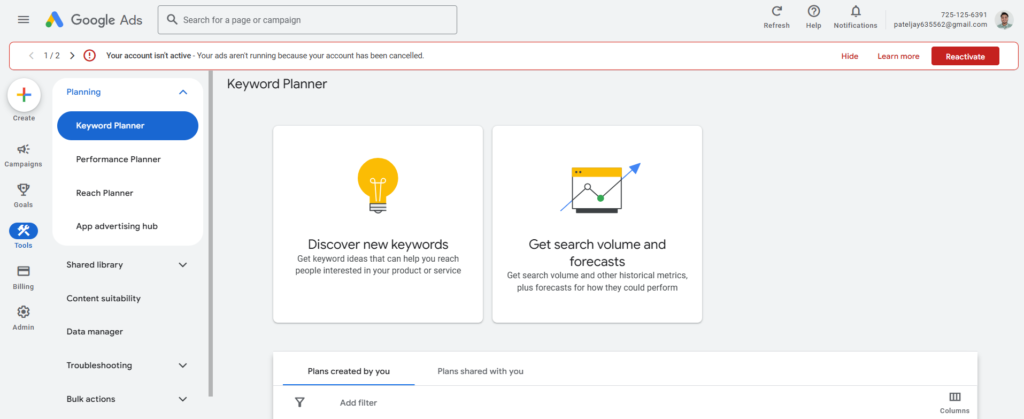
Google Keyword Planner is a free tool designed primarily for advertisers, but its features are equally useful for bloggers and SEO enthusiasts. It provides reliable search volume data, keyword suggestions, and competition levels based on Google’s extensive search data. This tool is invaluable for understanding what people are searching for and how competitive specific keywords are.
While it may lack some advanced features of paid tools, Google Keyword Planner excels in providing raw data straight from Google. It’s an essential tool for beginners and experts alike who want to create content tailored to audience demand.
Features:
- Keyword search volume and competition level insights.
- Cost-per-click (CPC) data for PPC campaigns.
- Free to use with access to Google’s proprietary search data.
- Ideal for beginners exploring keyword research.
5. AnswerThePublic
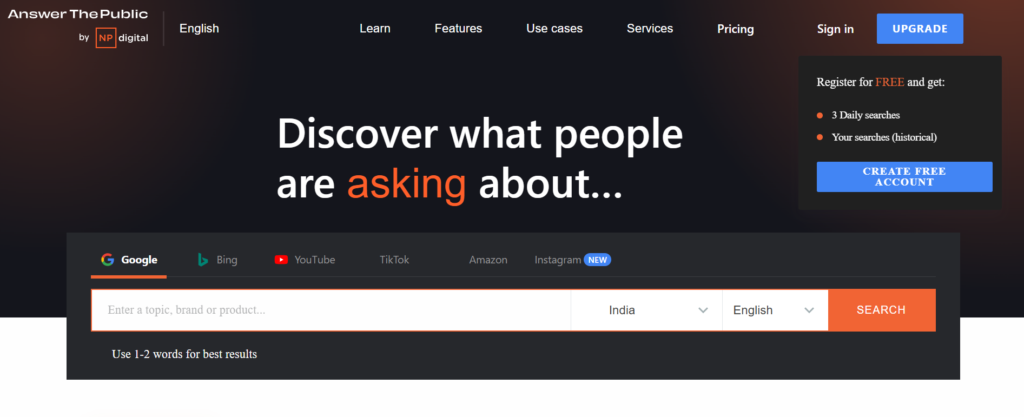
AnswerThePublic stands out as a creative tool for keyword research, focusing on the questions and phrases users search around a specific topic. This tool helps content creators generate blog ideas that resonate with audience queries, making it especially useful for creating FAQ sections or addressing customer pain points. The visual representation of data, in the form of mind maps or question wheels, provides a unique perspective on keyword research.
Ideal for brainstorming sessions, AnswerThePublic can uncover hidden content opportunities by displaying questions, comparisons, and prepositions related to your keywords. This approach enables bloggers and marketers to align their content strategies with user intent and improve engagement.
Features:
- Question-based keyword suggestions to address user queries.
- Visual representations of data, such as mind maps.
- Helps in topic generation and content brainstorming.
- Effective for creating FAQs and user-centric content.
6. Keyword Tool
Keyword Tool is a flexible keyword research platform that generates suggestions from multiple sources, including Google, YouTube, Amazon, and Bing. This multi-platform approach makes it ideal for bloggers and e-commerce businesses catering to diverse audiences. The tool excels in identifying long-tail keywords, helping users create highly targeted and specific content.
Even without an account, users can access basic features, making it accessible for beginners. Premium users unlock additional insights such as search volume and competition data, providing a comprehensive understanding of keyword potential.
Features:
- Supports keyword research across Google, YouTube, Amazon, and more.
- Generates long-tail keyword suggestions for targeted content.
- No account required to access basic features.
- Beneficial for e-commerce, video creators, and bloggers.
7. Moz Keyword Explorer
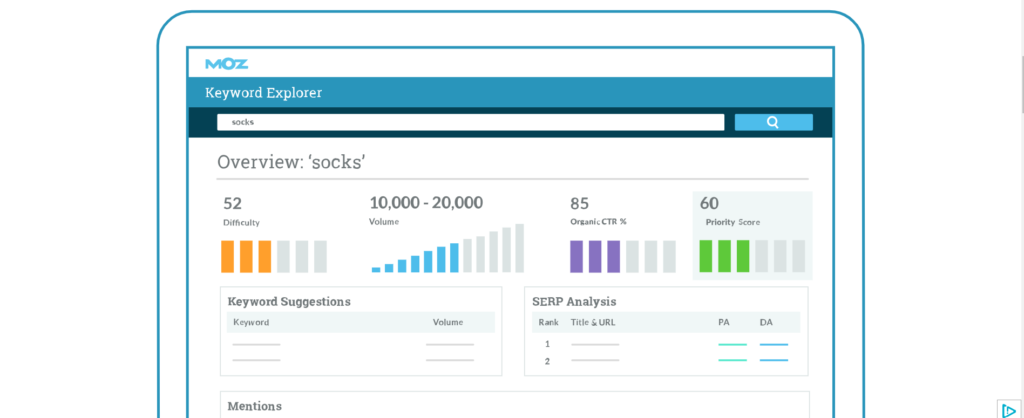
Moz Keyword Explorer offers a detailed analysis of keywords, providing data like search volume, difficulty score, and organic click-through rates (CTR). It is an excellent tool for SEO professionals looking to assess the viability of keywords and their potential to drive organic traffic. The tool also provides keyword suggestions, enabling users to expand their target keyword list effectively.
Additionally, Moz Keyword Explorer includes SERP analysis to help users understand the competitive landscape of their chosen keywords. With customizable metrics and a user-friendly interface, it’s a reliable choice for advanced keyword research and planning.
Features:
- Provides search volume, keyword difficulty, and CTR analysis.
- Keyword suggestions to expand content ideas.
- SERP analysis for competitive insights.
- Customizable metrics for tailored keyword research.
Tips for Effective Keyword Research

- Focus on Long-Tail Keywords: These are less competitive and often lead to higher conversion rates.
- Analyze Competitor Keywords: Use tools to see which keywords are driving traffic to your competitors.
- Monitor Trends: Keep an eye on seasonal trends or changes in search behavior using tools like Google Trends.
- Update Your Keywords Regularly: SEO is dynamic; revisit your keyword strategy periodically to stay relevant.
Frequently Asked Questions
1. What are the best keyword research tools for bloggers in 2024?
The best keyword research tools for bloggers in 2024 include Ahrefs, SEMrush, Ubersuggest, Moz, and Google Keyword Planner. These tools offer detailed insights into search volume, competition, and keyword difficulty, helping bloggers optimize content for SEO.
2. Why is keyword research important for bloggers?
Keyword research is important for bloggers because it helps identify high-traffic keywords that are relevant to their audience. By targeting these keywords, bloggers can improve search engine rankings, drive traffic, and increase content visibility.
3. How does Ahrefs help bloggers with keyword research?
Ahrefs helps bloggers by providing comprehensive data on keyword volume, difficulty, and backlink opportunities. With its robust keyword explorer tool, bloggers can discover high-potential keywords and track ranking improvements.
4. Is SEMrush good for beginners in keyword research?
Yes, SEMrush is great for beginners in keyword research. It offers a user-friendly interface with simple keyword analytics, competitor analysis, and a step-by-step SEO guide, making it an excellent tool for bloggers starting with SEO.
5. How can Ubersuggest improve a blogger’s SEO strategy?
Ubersuggest improves a blogger’s SEO strategy by offering keyword suggestions, competitive analysis, and insights into content gaps. It’s also an affordable tool, making it ideal for bloggers on a budget.
6. Is Google Keyword Planner still relevant for bloggers in 2024?
Yes, Google Keyword Planner is still relevant in 2024. It provides accurate data directly from Google, making it an essential tool for keyword research, especially for bloggers targeting high-traffic, competitive terms.
7. What features does Moz offer for keyword research?
Moz offers keyword difficulty scoring, rank tracking, and SERP analysis to help bloggers find the best keywords. Its “Moz Keyword Explorer” allows bloggers to prioritize keywords based on opportunity and competition.
8. Can bloggers use free keyword research tools effectively?
Yes, bloggers can use free keyword research tools like Google Keyword Planner, AnswerThePublic, and Ubersuggest effectively. These tools provide valuable data on search volume, trends, and competitor insights without the need for a paid subscription.
9. How often should bloggers update their keyword research?
Bloggers should update their keyword research at least every three to six months to stay competitive. Search trends and algorithms change frequently, so regular updates ensure content stays relevant and optimized for search engines.
10. What makes Ahrefs better than other keyword research tools for bloggers?
Ahrefs stands out because of its extensive backlink analysis, large keyword database, and detailed competitor insights. These features allow bloggers to discover untapped keyword opportunities and improve their search engine rankings.
Conclusion
In 2024 and beyond, using the right keyword research tools is essential for bloggers aiming to enhance their SEO strategy and attract more traffic. Whether you choose Ahrefs for its robust features, Ubersuggest for its simplicity, or any of the other tools mentioned, remember that effective keyword research can significantly impact your blog’s success. By understanding your audience’s search behavior and adapting your content strategy accordingly, you can set yourself up for long-term growth in the competitive blogging landscape.
Latest Posts
- What Is Alt Text in SEO? Boost Rankings with This Simple Trick!
- Does AI Write Seo-Optimized Content 3x Faster Than Human Writers
- Does ChatGPT Generated Text Hurt Your SEO? Find Out the Truth!
- Does the Number of Elementor Containers Affect SEO? Get the Facts!
- How Do Blogs Help SEO? Learn Why It’s a Game-Changer!